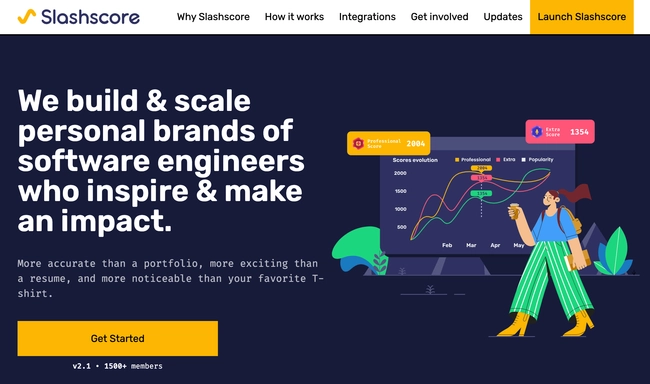In software development, authenticity isn’t just a feature—it’s a way of life.
Where lines of code intersect with lines of communication, authenticity is often overlooked as a powerful quality.
It can be tempting to blend in, conform to norms, and please everyone. However, true success and fulfillment come from embracing your authentic self and attracting those who resonate with your uniqueness.
In this article, we will explore the significance of authenticity in software development and how it can fuel collaboration, innovation, and success.
The Magnetic Force of Authenticity
Authenticity has a magnetic quality that goes beyond mere popularity. By embracing your true self, you attract like-minded individuals who appreciate your perspective, ideas, and coding style.
These are the people who not only like what you do but genuinely understand and connect with it. They become your partners, forming meaningful collaborations and friendships.
However, it’s important to recognize that authenticity also creates a love-hate dynamic. Just as the saying goes,
No matter how skillfully you write your code, there will always be someone who has their own unique preferences and opinions when it comes to coding styles and practices.
In software development, no matter how brilliant or passionate you are, there will always be naysayers.
But by being real, you repel those who don’t vibe with your authenticity, allowing you to find your tribe of supporters and collaborators.
The Perils of Being Fake
Conversely, the perils of being fake cannot be underestimated. Trying to please everyone and wearing a mask is an exhausting endeavor that leads to shallow connections.
While you may accumulate likes and superficial approval, you’ll never capture hearts and build meaningful relationships.
In software development, authenticity is crucial for successful teamwork. Pretending to be something you’re not can hinder opportunities for collaboration and growth.
Authenticity breeds trust, which serves as the bedrock of effective teamwork.
When you’re true to yourself, people are more likely to believe in your ideas, respect your expertise, and follow your lead.
Embracing Diversity and Resonance
It’s essential to dispel the myth of universal likability.
The world is beautifully diverse, and not everyone will resonate with your approach, coding style, or tech preferences. And that’s perfectly fine.
Embracing authenticity means embracing diversity and understanding that not everyone is meant to align with your mission.
You’re meant to be you, unapologetically and passionately. In this vast ecosystem, you’re like a magnet, attracting those who share your vision, values, and vibe.
Your tribe is out there, and it’s not composed of everyone. It’s composed of those who appreciate your authenticity and align with your mission.
Self-Rediscovery: The “Gap Time”
 Image source: Pexels
Image source: Pexels
The journey of self-discovery begins with a single step—often taken in solitude.
In the pursuit of success, we often find ourselves conforming to established norms and losing touch with our authentic selves. However, taking a moment of self-rediscovery, often referred to as the “gap time,” can be transformative.
This introspective period allows you to reconnect with your true self, explore your passions, and redefine your goals. It’s an opportunity to break free from the pressures of conformity and rediscover the unique qualities that make you who you are.
During this “gap time,” you have the chance to explore new technologies, experiment with different coding styles, and take risks.
By embracing self-rediscovery, you can tap into your authentic voice and unleash your full potential as an innovative problem-solver.
Real-Life Examples of Authenticity in Action
 Image source: Pexels
Image source: Pexels
The power of authenticity in software development can be seen through real-life examples of individuals who have embraced their unique voices and made a significant impact on the industry.
Linus Torvalds: The Authenticity in Open Source
 Image source: Flickr
Image source: Flickr
Linus Torvalds, the creator of Linux, is known for his unwavering authenticity in managing open-source development. His commitment to openness, transparency, and collaboration has attracted a dedicated community of developers who share his vision.
Through his authentic leadership, Torvalds has not only revolutionized the world of operating systems but also inspired countless software developers to embrace authenticity in their work.
Steve Jobs: The Power of Introspection
 Image source: Wikimedia
Image source: Wikimedia
Steve Jobs, the co-founder of Apple, understood the importance of introspection and self-discovery. During his early career, he spent time in self-imposed solitude, allowing himself to explore his true passions and values.
This period of introspection played a pivotal role in shaping his innovative thinking and design philosophy.
Jobs’ authenticity and commitment to pushing boundaries have left an indelible mark on the software development industry.
Basecamp: Authenticity as a Company Culture
Software development teams like Basecamp have harnessed the power of authenticity by cultivating an authentic company culture.
By prioritizing a strong and genuine work environment, Basecamp has not only developed successful products but also fostered a loyal user base.
Through their emphasis on authenticity, Basecamp has created a space where software engineers can thrive, collaborate, and innovate.
The Wingravity Way - Defying the Odds in the World of Software Development
As the CEO of Wingravity, I often find myself reflecting on our incredible journey, one that has been marked by challenges, triumphs, and most importantly, authenticity.
In 2017, when the tech industry was teeming with competition and naysayers, we stood firm in our belief that authenticity could be the guiding force behind our success.
This narrative is a personal reflection on how we, as a company, defied industry norms by boldly expressing our thoughts, embracing transparency, and pioneering a remote work culture.
It’s also about the lessons we’ve learned along the way, the traits of authentic leadership we’ve embraced, and the enduring impact of our commitment to authenticity, not just for us as leaders but for our entire organization.
A Bold Stand for Authenticity
In 2017, the tech landscape was crowded, and many doubted whether a new software company like Wingravity could thrive. We defied the odds by embracing authenticity as our guiding principle.
Instead of blending in with industry norms, we chose to stand out by fearlessly expressing our thoughts and opinions on various industry topics and our commitment to authenticity set us apart from the start.
Embracing Transparency
At a time when opacity was the norm, we took the road less traveled. We believed in transparency, offering our clients and partners an authentic view of our processes and values.
It wasn’t always easy, but this transparency fostered trust, allowing us to build lasting relationships.
The Journey of Slashscore
Our dedication to authenticity went beyond words. We embarked on the journey of building our own product, Slashscore. Through its challenges and successes, we learned invaluable lessons about innovation, resilience, and problem-solving. This hands-on experience strengthened our commitment to authenticity.
Pioneering Remote Work
Long before remote work became the global norm due to COVID-19, we were pioneers in remote work culture. We saw the potential for creativity and flexibility in a virtual workspace. Our remote work approach not only thrived but also set the stage for future success.
An Open Leadership Model
We believed in an open leadership model, where every team member’s voice mattered. This collaborative approach to leadership allowed us to harness the collective wisdom and expertise of our diverse team. It encouraged authenticity, empathy, and collaboration.
Traits of Authentic Leadership
Our journey also led us to discover the traits of authentic leadership that benefit not only leaders but also the entire organization. We learned the power of accountability, vulnerability, and empathy. We saw how consistency, adaptability, and listening fostered open dialogue and diverse perspectives.
Ethical Decision-Making
Upholding strong ethical standards and making decisions aligned with those values became a cornerstone of our leadership. This commitment to integrity created a culture of trust and ethical behavior.
Servant Leadership and Recognition
We embraced servant leadership, prioritizing the success of our team members. Sincere and authentic recognition of their contributions became our way of showing appreciation.
Resilience and Lifelong Learning
Our journey taught us the value of resilience and lifelong learning. We realized that embracing change and adapting to adversity were essential for growth and innovation.
Our experience underscored that authenticity is not just a virtue but a path to enduring achievement. By embodying these authentic traits and principles, we created a workplace culture that values authenticity, fosters innovation, and drives long-term success.
We learned that authenticity is not only about being true to ourselves but also about inspiring others to be authentic.
Embrace Authenticity: The Path to Success
In the cool and ever-evolving world of software development, embracing authenticity isn’t just a choice—it’s the way forward.
By being true to yourself, you attract like-minded individuals, forge meaningful connections, and create an environment that fosters collaboration and innovation.
Authenticity has the power to transform your career, your relationships, and your impact on the software development industry.
Dare to be authentic, embrace your unique voice, and let it guide you to unparalleled success.
Remember: No matter how skillfully you write your code, there will always be someone who has their own unique preferences and opinions when it comes to coding styles and practices.
Embrace your authenticity and find your tribe—the people who will not only like what you do but love and champion it. ❤️



